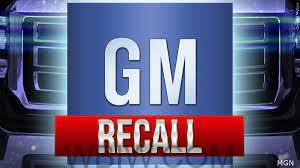
DETROIT, MI—General Motors has issued a safety recall for 107 units of the 2020-2022 Chevy Bolt EV and 2022 Chevy Bolt EUV due to a potential fire risk related to the vehicles’ diagnostic software. This issue stems from a previous “final fix” implemented in June 2023 for a larger recall affecting the electric vehicle (EV) models.

The recall, identified under GM Safety Recall number N242470160, involves a small subset of vehicles that may have received an incorrectly installed diagnostic software during the earlier fix. While the total number of affected cars is minimal compared to the original recall, the issue still presents a significant battery fire risk.
The vehicles involved in this latest recall were previously repaired with advanced diagnostic software designed to detect faults in the Bolt’s battery module. However, it appears that the software may have been improperly calibrated for this specific group of vehicles. As a result, the software may fail to recognize a defective battery, allowing the defect to go undetected, leading to a fire risk.
The fire risk is critical when the battery is at or near full charge. Without the proper detection, a malfunctioning battery could potentially cause a fire without the software intervening to prevent it.
Affected Vehicles:
- 2020 Chevy Bolt EV
- 2021 Chevy Bolt EV
- 2022 Chevy Bolt EV
- 2022 Chevy Bolt EUV
GM is advising owners of the affected vehicles to take several precautionary steps until they can bring their car in for service:
- Use the Target Charge Level mode: Set the vehicle’s charge limit to 90% to reduce the risk associated with a full charge.
- Avoid charging the vehicle overnight: Owners should not leave the car plugged in overnight to reduce the chance of an undetected fire.
- Limit the battery charge to 70 miles of range: Keeping the vehicle’s remaining charge at or above 70 miles will help mitigate the risks.
- Park outdoors: If the car is charged, it should be parked outside to reduce the risk of fire spreading to a building if an incident occurs.
The remedy for this issue does not require any new parts. GM technicians will reprogram the vehicle’s Body Control Module, Battery Energy Control Module, and Hybrid Powertrain Control Module 2. The reprogramming will correct the software installation and limit the charge to 80% of the maximum for up to 6,200 miles. If the battery module operates normally during this period, the charge limit will automatically increase to 100%.
Importantly, once the programming is done, the fix will be applied without requiring the owner to return to the dealership, and it will not affect the vehicle’s overall performance once resolved.
GM has also instructed that any affected Bolt units still in dealer inventory cannot be sold, delivered, or demonstrated until the software fix has been applied. Dealerships are prohibited from transferring these vehicles to other dealerships until the correction has been made.
This latest recall is part of an ongoing effort to address fire risks with the Chevy Bolt EV and EUV models. In July 2021, GM recalled 50,000 Bolt EV units, and in November 2020, 69,000 units were recalled due to similar issues with the vehicle’s battery modules and fire risk. Earlier this year, 72 vehicles were recalled for the same issue with incorrect software installation.
Affected owners are urged to contact GM customer service for further assistance and to schedule a service appointment.



